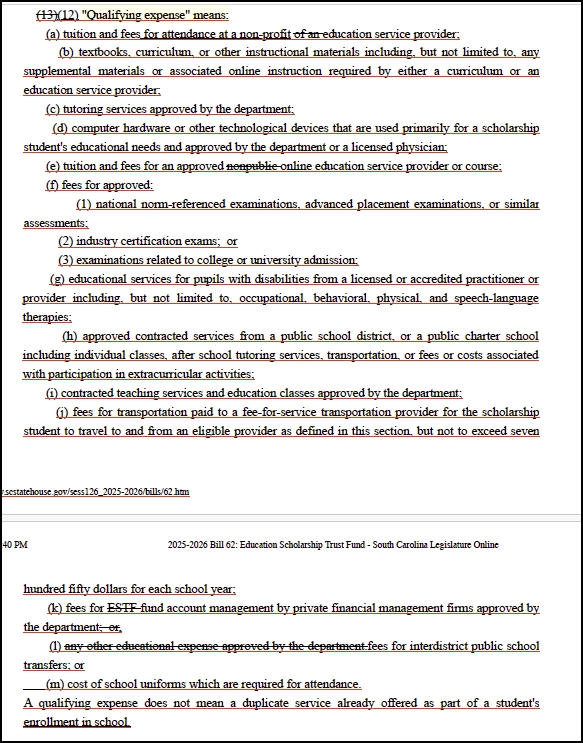We’re kicking off our legislative watchdog efforts with Bill S62. So, grab a cup of coffee ☕️, this one’s bound to leave you scratching your head in confusion. Somewhere in that confusion, you might ask yourself, why is this a bill our Republican General Assembly (GA) Majority is pushing?
We’ve explained in detail why codifying a program like this is a disastrous mistake:
It violates a core conservative principle: Limited government.
It centralizes control: This program sets the stage for pulling all educational options under one government-controlled umbrella.
It creates dependency: Taxpayer-funded programs like this guarantee growth, draining even more resources and demanding more government funding.
IMPORTANT: There is no way to safeguard against these outcomes or the ripple effects they’ll unleash.
We’ve written extensively about the issues with government school choice programs. You can read our articles HERE.
Anyway, let’s begin.
Our General Assembly (GA) is going to try again. In September, the South Carolina Supreme Court struck down the school choice program under S39 as unconstitutional. In fact, this makes strike three because the SC Supreme Court (doing their job correctly) struck down school choice laws twice before.
You’d think three strikes would mean you’re out. Yet, here we are again. By the way, every time the GA pushes an unconstitutional bill, it wastes our tax dollars.
Introducing S62—“Cheese Bait” Bill.
S62 is nothing more than a revamped version of the same government-controlled school choice program found in S39, repackaged with a shiny new name, the K-12 Education Lottery Scholarship Fund. And it comes with a new funding source, a few regulatory tweaks, and undoubtedly more changes to follow.
This, my friends, is just another slice of cheese bait.
And because they know this revamped attempt could hit the same legal wall, they’re already working to repeal the Blaine Amendment to secure its success. After all, that pesky amendment keeps blocking their efforts to embed yet another government program.
What’s Wrong With Bill S62?
Let’s state the obvious about this bill: it’s yet another government-controlled program that expands state control over educational options. It’s a redistribution of hard-earned taxpayer money, it fosters dependency, and despite the so-called revamp, this bill is likely to face legal challenges, wasting even more of your tax dollars in the process.

New Funding Idea, But Still Public Funds
Next, they pitched a “new” funding idea, but spoiler alert, it’s still public funds at its core. This time, they’re pulling money from the Education Lottery Account—the same fund that provides scholarships for South Carolina colleges.
Confusing? Absolutely.
Here’s how it works: the Education Lottery Account will now fund K-12 scholarships. Section 59-8-120(C) spells it out:
"The State Treasurer shall transfer ... an amount equal to the average per-pupil funding from state sources for the prior academic year as provided by the Office of Revenue and Fiscal Affairs to the K-12 Education Lottery Scholarship Fund."
So, let’s ask the question every conservative should: Who’s paying for this? Answer: The public.
While lottery proceeds come from ticket sales, these funds become public money the moment they’re deposited into the Education Lottery Account. The General Assembly (GA) controls how these funds are allocated, meaning they’re ultimately public funds for government programs.
Lottery funds are currently used to buy school buses and provide college scholarships for students attending both public and private colleges in South Carolina—a program that has operated without legal challenges. Diverting those funds to cover private K-12 scholarships? That’s a whole different story.
Reality Check, reallocating lottery money for K-12 scholarships means replacing those dollars with general fund tax revenue. Translation—taxpayers will now be paying for both public schools and this new program.
It’s Government Control
From the very start, the bill makes it clear that the government will control every aspect of this program, which is exactly why it’s a government program.
“Department” means the South Carolina Department of Education.”
The Department of Education will decide:
Who qualifies as an eligible student.
Which education providers are approved.
How the funds are spent.
Oh yes, and “wellness checks” for students. (More on this later.)
Easier Access, Greater Government Power
The bill loosens eligibility requirements over time, increasing income limits to:
200% of FPG in 2024-2025,
300% of FPG in 2025-2026,
400% of FPG in 2026-2027,
And ultimately 600% of FPG in subsequent years.
At first glance, you might think this is great. But pause and think critically, are they making it easier for families to hand over their educational freedom to the government?
And let’s be honest, this bill will go through the legislative sausage-making factory. Eligibility will shift, funding will balloon, and the bill will morph into something worse before it’s done.
$8,000 Per Eligible Student or More?
The amount transferred will be equal to the average per-pupil funding from state sources for the prior academic year.
Pause. Equal to the average per pupil? That’s what approximately $8,000 per eligible student? Yikes, by year three, with 15,000 students, this program will cost around $120 million annually!
Who Approves “Education Service Providers”?
Remember what we said before, the Department decides everything.
"Education service provider” means a person or organization approved by the department.
Translation? Bureaucrats will pick and choose winners—and you’ll fund it.
What Counts as a “Qualifying Expense”?
From computers and online services to transportation and therapies, the bill includes a broad range of expenses. This wide scope, combined with limited cost controls, means program expenses are bound to skyrocket.
Nah, this won’t lead to abuse of funds. I’m sure everyone will use this money for its intended purpose.

Parents Must Agree.

Parents must "annually attest" to a laundry list of Department-dictated requirements, including:
Assessment testing,
Data collection,
Adherence to Department-approved providers, and
Wellness checks for students participating in online programs.
Yes, you read that right: WELLNESS CHECKS.
If you choose an online provider, your child must agree to in-person WELLNESS check-ins.

Conclusion: S62, Same Cheese Inside This Trap
At the end of the day, Bill S62 is a repackaged version of S39, a program found unconstitutional just months ago. It’s still redistribution. It’s still government-controlled education. And it comes with a healthy dose of wellness checks, mandatory data collection, and red tape.
Plus, this bill will change as it goes through the legislative process, so Homeschoolers beware—you don’t want to be pulled into this trap.
South Carolinians should ask themselves the following question.
Do we really want to fund another government program where the government decides eligibility, controls education providers, collects data, and monitors your child’s well-being?
Take Action: Stop Bill S62
On January 8, 2025, the Senate Education Subcommittee will hear S62, and the full committee will follow soon after—before the legislative session even starts.
Here is the contact information for the members of the South Carolina Senate Education Committee.
What You Need to Know
✅ No Public Testimony Allowed: Lawmakers are shutting you out.
✅ Growing Government: This bill expands state control, adds endless regulations, and creates dependency.
✅ Still Using Public Funds: Lottery money is still public money. This is nothing but a workaround for what was ruled unconstitutional.
✅ It’s a redistribution of wealth.
Real Conservatives Stand For:
Limited government
Individual responsibility
Protecting taxpayers
What You Can Do:
Contact Your Legislators: Tell them South Carolina doesn’t need more government control.
Share This Message: Spread the word and let others know what’s happening.
The government ruined public education and now they’re coming for private schools and soon homeschooling.
Stand up now. Your voice matters.
Disclaimer: The views expressed in this article are those of the author and do not constitute legal or professional advice. ConservaTruth assumes no liability for any actions taken based on this content. Read more.
Listen to this short audio to find out why you should subscribe to our weekly email updates.

Subscribe to ConservaTruth's Email Newsletter for curated insights on South Carolina's legislative activities and conservative viewpoints, delivered straight to your inbox! With vetted and easy-to-understand information, our newsletter empowers you to become an informed and engaged citizen, actively participating in safeguarding our cherished Constitutional values. Don’t miss out on crucial updates—join our community of informed conservatives today!





Comments